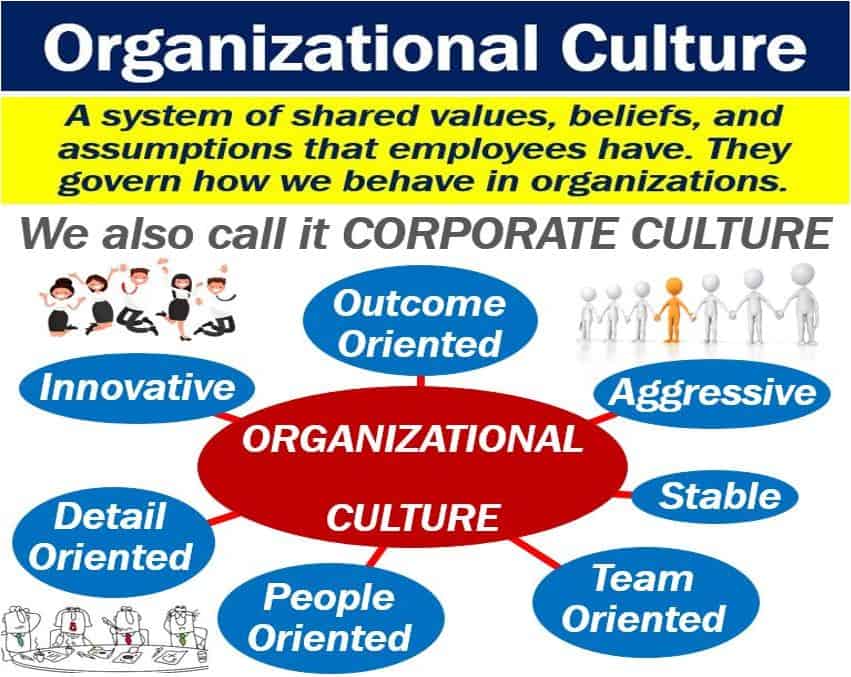Organizational Culture is a group of internal values and behaviors in an organization. It includes experiences, ways of thinking, beliefs and future expectations. It is also intuitive, with repetitive habits and emotional responses. We also call it Corporate Culture.
Organizational Culture is the result of a perception within the company that its employees all share.
Richard Perrin, Partner and Head of Advisory at KPMG in Romania, defines the term as:
“The sum of values and rituals which serve as ‘glue’ to integrate the members of the organization.”
Corporate culture comes under the umbrella theme ‘organizational economics.’ Organizational economics is the study of how humans create and develop organizations. It also looks at how organizations affect economic growth.
Organizational culture – leaders
Companies can create or shape their organizational culture through leaders. Leaders can communicate and lead according to what companies want in their corporate culture.
However, even though leaders can shape the internal culture, in some cases companies already have a strong and established culture. In such cases, this can determine what type of leader the organization requires.

Company leaders also have to be aware that corporate culture can change. We must remember that culture is linked to knowledge. In other words, whatever didn’t work in the past, would have to be done differently.
Consequently, if any belief or idea doesn’t go with the internal environment, then the organizational culture will evolve.
Adapting to change
Leaders should also be aware of how hard or easy it can be for the corporate culture to adapt to changes in the company. Adapting to the marketplace may also be hard. In this context, the word ‘marketplace’ means the same as ‘market’ in the abstract sense.
In some cases, employees can be resistant to change. They may even try to work against it. However, communication leaders can address this behavior.
Organizational culture only works effectively if all employees participate and constantly work to shape it. However, it is not something that changes overnight.
Organizational culture – types
Organizational culture is a unique phenomenon. However, there are some general corporate culture classifications.
Power culture
An organization ruled by a power culture has a strong leader influencing behavior and values. The leader also influences ideas and beliefs.
This type of culture is very common in small companies, early-stage businesses, and startups.
Role culture
In a role culture, formal systems determine values and beliefs. Government departments, for example, exist in a role culture.
Task culture
In a company with a task culture, employees value task completion and achievements.
We often see this type of culture in project teams where time and task resolution are important.
In other words, we see this in project teams where getting things done and meeting deadlines are top priorities.
Personal culture
In this type of culture, personal interests, beliefs, and ideologies are important drivers.
A professional services company that incorporates a lot of the beliefs and ideas of its own employees, for example, has a personal culture.
Examples of organizational culture
Every organization has a unique culture, but some common examples include:
1. Innovative Culture
- Example: Google
- Characteristics: Encourages and values new ideas, risk-taking, and creative thinking.
- Behavior: Employees are encouraged to spend time on personal projects and think outside the box.
2. Hierarchy Culture
- Example: Many government agencies
- Characteristics: Structured, formalized, and focused on internal processes and control.
- Behavior: Employees typically have clearly defined roles, responsibilities, and processes to follow.
3. Team-oriented Culture
- Example: The Container Store
- Characteristics: Emphasizes collaboration, open communication, and group decision-making.
- Behavior: Employees often work in teams and are evaluated on both individual and group performance.
4. Outcome-oriented Culture
- Example: Amazon
- Characteristics: Values achievement, results, and action over inaction.
- Behavior: Employees are focused on meeting goals and are rewarded for performance.
5. People-oriented Culture
- Example: Southwest Airlines
- Characteristics: Emphasizes employee development, fairness, and well-being.
- Behavior: Management values and prioritizes employee satisfaction and well-being.
6. Detail-oriented Culture
- Example: Four Seasons Hotels and Resorts
- Characteristics: Precision, attention to detail, and reliability are valued.
- Behavior: Employees are expected to perform their tasks with high accuracy and reliability.
7. Aggressive Culture
- Example: Uber (especially in its early years)
- Characteristics: Competitive and assertive behavior is valued to achieve company objectives.
- Behavior: Employees may be motivated by aggressive goals and may prioritize achievement over collaboration.
8. Stability Culture
- Example: Many utility companies
- Characteristics: Prioritizes maintaining the status quo and avoiding risk.
- Behavior: Employees are encouraged to adhere to established procedures and protocols.
9. Customer-centric Culture
- Example: Zappos
- Characteristics: Emphasizes delivering superior customer service and experience.
- Behavior: Employees are empowered to make decisions to satisfy customer needs and expectations.
10. Sustainability-focused Culture
- Example: Patagonia
- Characteristics: Emphasizes environmental responsibility and sustainable business practices.
- Behavior: Employees are encouraged to consider the environmental impact of their decisions and actions.
11. Integrity-based Culture
- Example: The Johnson & Johnson Credo emphasizes ethical behavior and responsibility to customers, employees, communities, and shareholders.
- Characteristics: Prioritizes honesty, ethical behavior, and social responsibility.
- Behavior: Employees are expected to act with integrity and make ethical decisions.
Each organizational culture type has its own set of advantages and disadvantages, and the effectiveness of a particular culture type can depend on the context and industry in which an organization operates. The best organizational cultures often blend elements from different types to match their specific needs, industry requirements, and organizational goals.
Video – organizational culture
This Denison Consulting video talks about organizational culture and explains what it is. It begins by telling us that every organization has its own unique culture.
